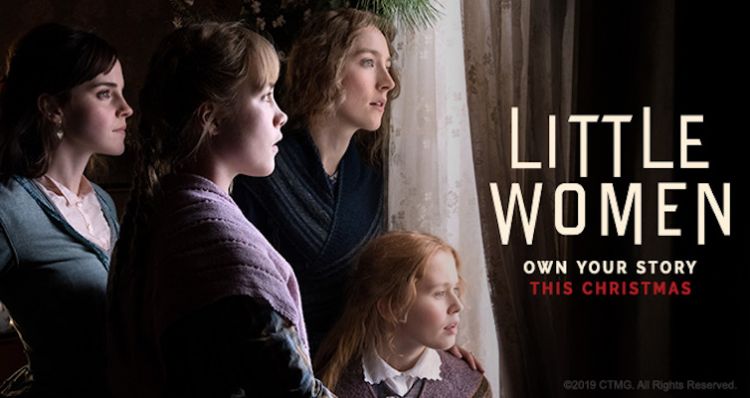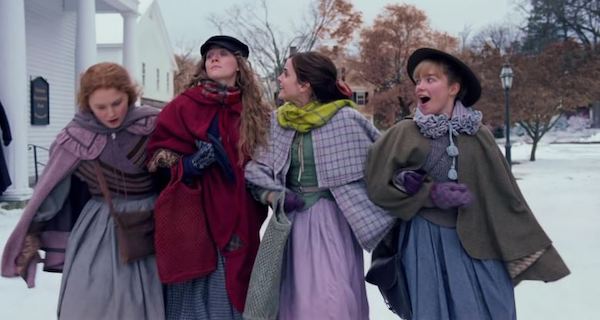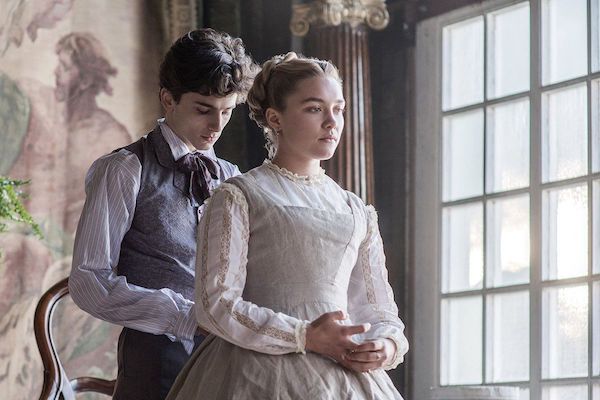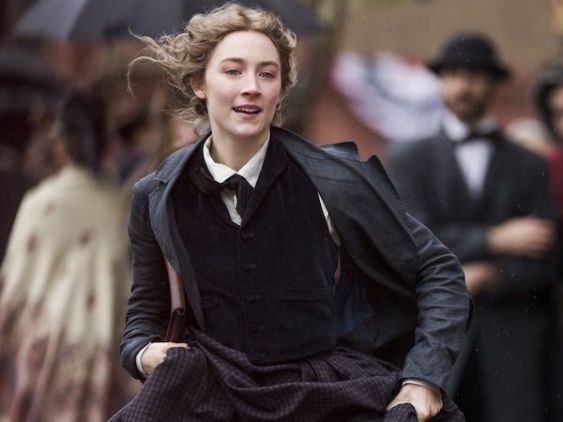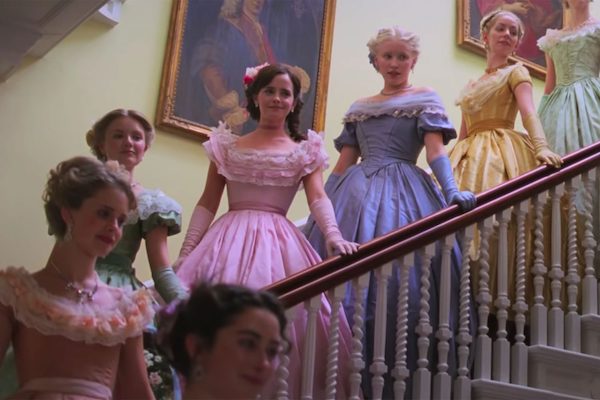I did not expect to have thoughts about Little Women. I had read the book as a college student, I enjoyed other adaptations of the book (and yes, that includes the web series), but I didn’t think I would have any strong opinions on Greta Gerwig’s adaptation. I thought I would enjoy it, of course; Gerwig has a great visual eye and all of the actors involved are stellar, but what is there to take away from Little Women that we haven’t already seen?
Turns out, I do have thoughts. Especially now that Gerwig did not get an Oscar nomination.

If you’ve never read the book or seen any of the adaptations, Little Women follows the four March sisters living in Connecticut during and immediately after the American Civil War. Meg, the eldest, wishes to be a socialite; Jo is an adventurous and boisterous writer; Beth is the most musical but also the shiest and most frail; and Amy as the youngest is artistic, dramatic, and often lonely.
The four grow up together, alongside their childhood friend Laurie, mother Marmie, and disgruntled Aunt March. Lots of things happen, including Beth dying from damage to her heart after a bout of scarlet fever, Jo rejecting Laurie’s proposal and moving to New York to be a writer, Meg getting married to the improvised tutor John, and Amy falling in love with Laurie years later in Paris.
Now, you might read that description and think, wow, that sounds kind of boring. And in a way, yes, that’s the point. The novel, and by extension the movie, is not about grand battles or epic romances. It’s a character-driven story that has us fall in love with these characters, giving us a look at the complex inner lives of people history tends to overlook. What I think Gerwig nails is how girls play and interact. They’re often silly, over-the-top, easily excited, full of imagination and fire. This gets further highlighted by Jo’s publisher initially rejecting the in-universe version of “Little Women” as written by Jo but changing his mind when his daughters demand to know how the story ends.
Gerwig makes a fantastic choice in the structure of the movie. Rather than playing it all chronologically, we see the book laid out thematically. Therefore, we see Meg’s marital struggles along with her courtship with John, Jo’s writing work back at home with her work in New York, Beth’s shyness and sickness, and Amy’s feelings of abandonment at home and loss in Paris. Thankfully, people tend to be familiar enough with the book that no one should be confused, but there are plenty of visual cues to let you know when we are.
I think Gerwig handles Amy and Laurie’s romance really well. Laurie, in this version, is kind of a jerk — he gets drunk, he fails to meet up with people, he’s aloof and judgmental. Amy, however, has lost a lot of her childhood innocence and is now a thoughtful young woman looking to her future with a cautious optimism. They both have room to grow but it’s clear they care for each other quite a bit, and are willing to face the future together. Gerwig makes it clear through Amy that even the “silliest” of the siblings faces reality and also is unapologetic for her ambition. There are many, many fantastic essays on Amy, so we’re going to move on there.
If you’re looking for tour de force performances, then you’ve found yourself two. Saoirse Ronan as Jo is pitch-perfect casting, a mix of determination, shrewdness, and vulnerability. But you could tell she was going to be great from the trailers. The real revelation is Florence Pugh as Amy, transitioning effortlessly from the sweet and naive girl into a tough and loving young woman. Truly, if she doesn’t get the Oscar, I will be offended (which is par for the course with the Academy but more on that another day).
I do think that Laura Dern and Meryl Streep give great performances, but it’s definitely understated. I think Eliza Scanlen does a lot with Beth and if she weren’t overshadowed by Ronan and Pugh, she would be getting more praise. Emma Watson is a fine Meg, but frankly, I was unimpressed. Timothée Chalamet as Laurie is excellent, and I love that they made him more of a jerk that had room to grow rather than this perfect, unaffected gentleman.
In terms of visuals…wow. Gerwig proved her directing chops with Ladybird but Little Women feels like a victory lap. Every scene is gorgeous — perfectly composed, the colors bright but homey, the costuming is stellar. Seriously, if you want to watch a movie just for pure aesthetics, this is as good as any you’ll see this year.
It’s not a perfect movie, though it certainly gets close. For all of its fleshing out of Amy, Meg still gets short shrift. I might be slightly biased as Meg was always my favorite, but there’s a lot there to work with. It’s easy to dismiss Meg as just wanting nice things and being a traditional girl, but I think there’s so much of her character that strives for a level of normalcy and romanticism that gets overlooked.
As the oldest, Meg has a lot expected of her and often is mocked for liking pretty things by her sisters and, in the film, by Laurie. Meg wants to belong, more than anything, to a world different from her family. This is something her husband John understands, to a degree, wanting her to have nice things even though they can’t always afford it. Still, Meg sacrifices her desires to be a good wife and mother, struggling with guilt and loss of a life she wanted in the name of love. I could write a whole essay about this because I think it’s important to acknowledge that women who want “normal” things and lives are just as valuable and interesting as those who are more ambitious. Someone had to get the short stick, and this time around it was Meg.
I also find the ending wholly unsatisfying. Rather than sticking with the book ending of Jo marrying the strange and eccentric Bhaer, Gerwig implies that perhaps she didn’t. Before Laurie comes home with Amy as his bride, Jo confesses to her mother that she is desperately lonely and wants to be married for companionship. And that is a legitimate feeling that lots of women have, so it felt good that was acknowledged. But Gerwig doesn’t want to give us a straight answer — what she does is she breaks up the scene where Jo runs after Bhaer with a meeting with the publisher, who tells her that the main character in the book has to be married. She argues that she shouldn’t have to, as the character has always said she wouldn’t marry, but ends up giving in after negotiating royalty fees and an advance. The scene then continues with Bhaer and Jo confessing their love and then opening a school together. Now, is this real or fiction? No one knows.
While I like that the focus is on Jo coming into her own as a writer, I feel like this half not-answer isn’t a good way to end the film. Bhaer in this version proved himself to believe in Jo’s work and talent, and even supported her endeavors, so he would have made a good match for her. Additionally, it would have been an empowering moment for Jo to say no to marriage outright, like Alcott always wanted. Trying to have the cake and eat it too makes it seem like the film just didn’t want to piss anyone off.
Summary
Greta Gerwig has crafted a masterpiece — it is by no means perfect but it does manage to keep what’s great about the book but bringing the characters into the kind of nuance that we expect from our narratives in the 21st century. Stellar acting, gorgeous visuals, and while it doesn’t stick the landing, it’s well worth the watch.


